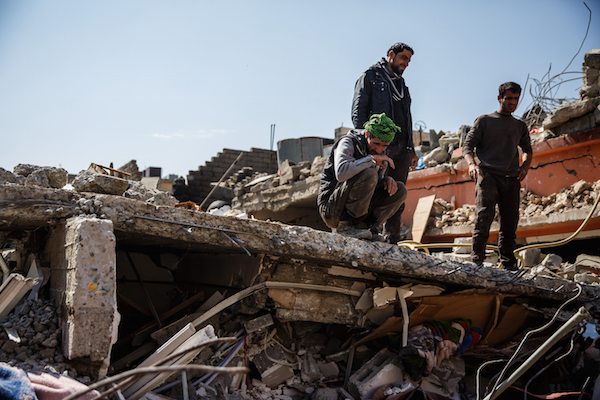In the opening months of the Donald Trump administration, there has been little sign of a coherent foreign policy taking shape. What is happening, however, is a dramatic militarization of US policy in the Middle East—one that is occurring largely without the consultation of American allies, and with hardly any public scrutiny. In the case of the war in Yemen and the campaign against ISIS in Iraq and Syria, these developments could have extraordinary consequences for US security and even the stability of the Middle East itself.
On March 26, The Washington Post reported that the Defense Department is asking the White House to remove restrictions on providing military aid to Gulf allies who are fighting the Iran-backed Houthi rebels in Yemen. Already, unspecified US Special Operations Forces (SOF) are operating not only in Yemen, but also in dozens of other countries in Africa and Central Asia.
The most disturbing discussion to date revolves around the US military being allowed to create free-fire zones in which US forces could target and bomb potential enemies without regard to civilian casualties or damage to economic infrastructure—a stark repudiation of counter-terrorism rules set down by the Obama and Bush administrations. The New York Times has reported that three provinces in Yemen have been declared “an area of active hostilities”—in other words a free-fire zone—and that parts of Somalia will soon be added the list. Western diplomats in Brussels say areas of Afghanistan where the Taliban are strongest may also be added. Such a policy, encouraging indiscriminate strikes, will undoubtedly produce thousands more Muslim radicals, undermine humanitarian relief and destroy hopes of economic reconstruction.
Instead of pursuing a comprehensive approach that involves diplomacy, economic aid, conflict resolution and alliance building, Trump has reverted to a dangerous dependence on the military while undermining all other US state institutions that deal with the wider world. Apart from bombing, what exactly is the Trump strategy for Yemen? Does the administration support continuing UN efforts to mediate between the Yemeni government and the Houthis? Now that the Defense Department wants to remove the arms embargo in Yemen, what will that mean for the conflict itself? What diplomacy does the administration plan for dealing with the escalating regional rivalry? And who, in fact, is in charge of Yemen policy at the State Department or the National Security Council? None of these questions are being answered or even addressed.
Yet Yemen is still a minor issue compared to what the US plans next in Syria. Here too civilians are dying from US air strikes—thirty-three civilians were killed on March 22, when US led coalition bombers hit a school. Will Trump support the Russian-dominated, UN-led peace process in Geneva? Is the US interested in forming a stronger Arab-Western alliance against the Islamic State, while also trying to broker a political solution? Is the US prepared to let President Bashar al-Assad stay in place? Who will pay for the flood of refugees still coming out of Syria or its future reconstruction? None of these questions appear even to be being asked by the White House.
Clear answers become even more unlikely when the Trump administration is considering a possible one-third cut in the $50 billion budget of the State Department and the Agency for International Development in order to fund a $54 billion increase in the Defense budget. Mick Mulvaney, director of the White House Office of Management Budget said on March 4 that the cuts would see “fairly dramatic reductions in foreign aid.” There has been widespread opposition from Congress, aid groups, and the media to these proposals.
Such cuts would undermine the State Department’s ability to launch diplomatic initiatives or even influence future US foreign policy. The firing of many regional and country experts would create a vacuum at the State Department and only lead to greater disdain abroad for US diplomacy. The US will increasingly be unable to persuade autocratic governments to respect human rights, press freedoms, and civil society. Much of USAID’s funding goes to supporting civil society and non-governmental organizations abroad for which Trump has shown no interest; and budget cuts could have a severe effect on these activities.
Secretary of State Rex Tillerson, who has barely made a dent in Washington and has failed to staff his department, leaving hundreds of ambassador slots vacant, has been silent on major foreign policy issues, avoided meeting visiting dignitaries, and isolated the media. There are serious questions about what part, if any, the State Department will have in the Trump administration’s foreign policy.
Trump’s growing dependence on a military strategy around the world will reduce US influence with its allies and all major powers. It also makes it less likely that they will join what Trump hopes will be a crusade against the Islamic State. Autocrats around the world will follow the American example and be encouraged to abandon diplomacy and politics and use force to get their way. We will be left with a US that is set on inflaming conflicts rather than ending them, a US that abandons any sense of global responsibility and pays no regard to international agreements. A new global era has begun in which American allies can no longer rely on American leadership. It may be the most dangerous period we have seen in our lifetimes.

